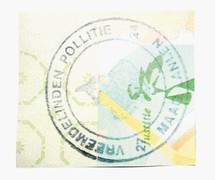February 15, 2010
The cost of playing red-footed football for European top-league clubs
 An article in the Dutch paper NRC Handelsblad reveals that
An article in the Dutch paper NRC Handelsblad reveals that
A classified Dutch government report has revealed that criminals stole 341,956 passports, identity cards, visa stickers and drivers' licences from European government facilities since 2000.
OK! That would be 34k per year across Europe. It states that purchasers
are willing to pay increasingly high prices for travel documents and passports," the report states. Depending on the country and the type of document sought, prices are said to vary from 500 to 11,000 euros .
That's for documents based on stolen-as-blank European documents (which supports our rule of thumb: 1,000 euros for a good set). Later on the article gives one estimate of costs (to us) or profits (to crooks):
"The damages incurred can amount to at least a hundred times the prices paid for these documents." A couple of years ago, Dutch customs officials estimated that in the Netherlands alone, fraud committed using forged proof of identity cost three billion euros annually.
If one guesses say a tenth of the numbers for Netherlands alone (finger in air, divide European numbers above by 11), then each year, 3000 good identity documents are selling into the Netherlands and chasing 3 billion euros of fraud. That's 3 million bux per identity sale .
That's serious money. This is for the real item, and only the printing would give them away on inspection, which makes those numbers useful. Here's more information.
To combat the abuse of stolen documents, customs offices protecting the Schengen area's outer borders have the so called Schengen Information System (SIS) at their disposal. The SIS lists not only all persons and vehicles wanted by law enforcement in countries party to the Schengen treaty, but also contains data on all blank travel documents that were stolen or went missing from government facilities there. According to the Dutch police, the database contains 341,956 documents in all. However the SIS is not consulted with every entry into the EU.
So the headline 3.4m over Europe, the 2000s decade, would be a floor rather than ceiling. Another remarkable pointer in the article:
The report, entitled Report on Security norms for Diplomatic Posts, lists numerous European embassies and consulates that were robbed around the turn of the century by Eastern and Central European "crime syndicates", bagging large numbers of passports and visa stickers in the process.The gangs "occasionally used extreme violence" to gain access to the "poorly secured" diplomatic posts, the report states. The gangster were privy to "know-how and techniques used by former intelligence agencies". Netherlands, Spain, Austria and Portugal ... Vienna, Geneva, Lausanne, Brussels and other locations. The crime spree was kept under wraps at the time, but the thefts were recently confirmed by the foreign ministry at NRC Handelsblad's request.
Which would point the finger at organised crime. Which means it is serious, it is working, it is making money, and it isn't going away. Add to that observation the above 3 million profit number, and now we something serious: That's a trend we can rely upon .
Who are likely customers? The report lists the usual grab-bag of scumbags & losers such as "criminals, human traffickers and illegal asylum seekers," terrorist(s):
Stolen Belgian passports were used by Abdessatar Dahmane and an accomplice in September 2001 to pose as journalists and gain access to Ahmed Shah Massoud, the leader of Afghanistan's Northern Alliance, and kill him in a suicide bombing.
And this odd one:
Brazilian football star Leonardo Santiago was caught red-handed in 2000 when his Portuguese passport proved to be a fake. The 17-year-old darling of Rotterdam's Feyenoord team had thus been able to circumvent the strict regulations that apply to all non EU-citizens playing for European football clubs.The story is by no means unique in European football. In recent years, law enforcement officials in France, Italy and Spain have caught dozens of 'Leonardos', playing for clubs like Inter Milan, Lazio Roma, AS Monaco and Saint-Etienne.
Shouldn't that be "caught red-footed" ? Joking aside, what exactly is the harm here?
Teams and players alike benefited from the fraudulent documents. In France and Italy, regulations only allow clubs to field a limited number of non-EU players. In the Netherlands, the same foreign nationals can only be signed if they are paid at least 503,000 euros annually.
Exactly. One presumes there is no serious cost to society to fielding a footballer of the wrong colour in a game. Lumping mass entertainment in with serious crime is a misuse of police resources, and we'd rather they be chasing those real criminals mentioned earlier, and now here:
 |
| Police in Dubai have issued arrest warrants for 11 suspects they want to question about the killing of a senior Hamas official in Dubai. The suspects include six men travelling on false British passports. |
 |
| Added much later: Fuller list of 26 suspects is above. |


